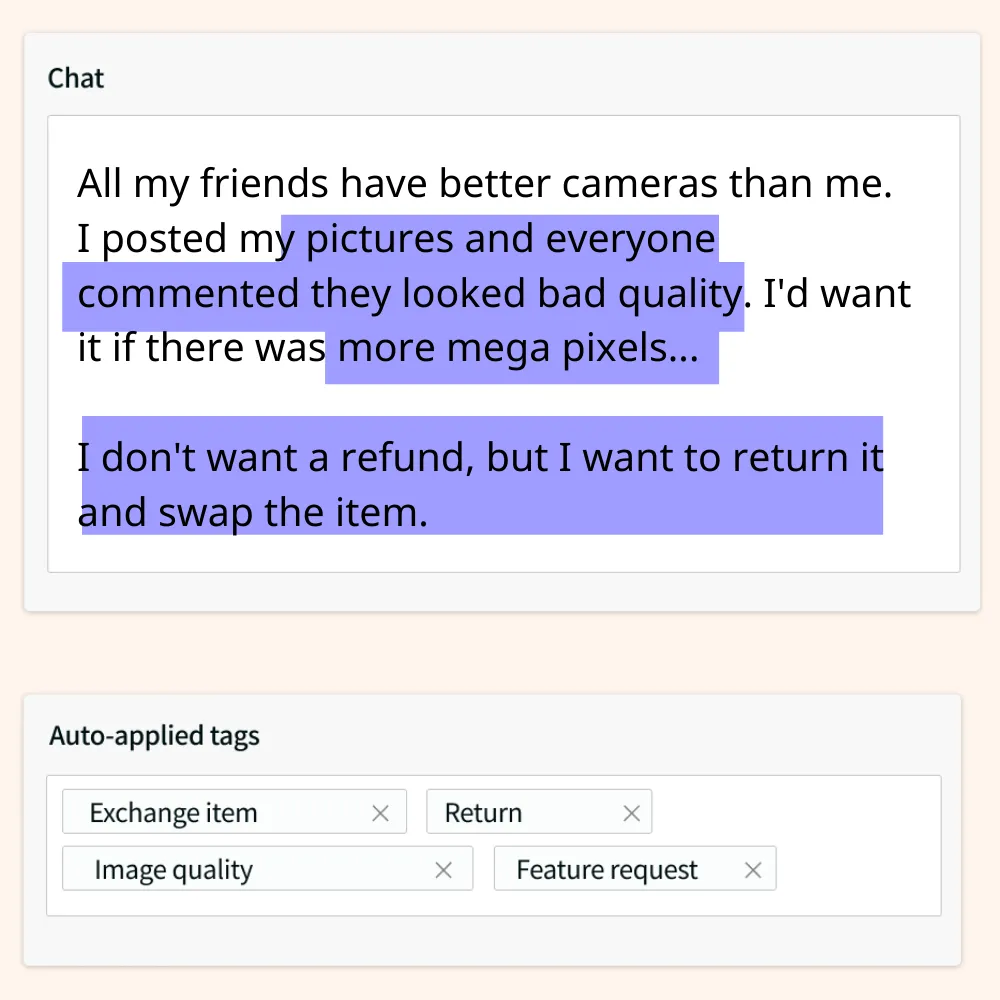Accurate, detailed tags (the kind only provided by machine learning) give you clarity on why each customer contact you—even when you have thousands of contacts per month.
Once each support query is tagged with multiple topics, reasons and other useful information, they become an incredibly powerful tool for driving positive business outcomes.
Those tags can be huge for support departments (you can use them to remove time-consuming tasks, reduce ticket volume, and improve SLA times).
However, the positive impact transcends just one department.
If leveraged properly, they can create a strategic difference company-wide and help the whole business grow.
In this article, we take a look at how accurate, detailed support ticket tags can impact your business and why, therefore, automating your ticket tagging with machine learning should be high on your priority list.
Optimise customer support
There are several use cases within the customer service function where support tickets can save time, support the hitting of KPIs and improve the customer's experience.
1. Use tags to reduce average handle time
- Auto-route tickets: Based on AI ticket topic tags, we can create rules and triggers that route tickets directly to a particular team. For example, agents with particular training can handle more complex tickets.
- Auto-prioritise tickets: Some ticket topics might be linked to negative business outcomes (like cancellations or churn). We can assign priority to tickets with those tags so the situation is handled quickly.
2. Use tags to improve agent productivity
- Let agents focus on customers: Manual ticket tagging is a repetitive, boring task. Our AI completely replaces that process so agents can focus on what they do best: service.
- Improve agent training: With an accurate understanding of why customers contact you, and the volume that topic arises, you can focus training around the most common issues and retrain agents when a new topic arises.
3. Use tags to reduce ticket volume
- Root cause analytics: Having granular 'reasons for contact' tags in the SentiSum deep dive dashboard, allows you to get to the root cause of contact drivers, easily build quantitative evidence (e.g. volume per month of customers impacted) and make a case for tackling that issue.
- Build a knowledge base: Accurate, granular ticket tags can help you prioritise which knowledge base articles to write first. You could topics that are impacting the most customers and automatically send them an article answering the issue.
- Anomaly detection and trend analysis: Our machine learning engine will continuously surface new issues and topics that have arisen and are causing customers to contact you. With this knowledge, you can proactively tackle those issues so they don't impact future customers.
- Link tickets to CSAT: CSAT survey responses are mostly brief and unclear, if filled out at all. With our tagging system, we can link survey results with the topic of conversations that drove those responses. A clear view of CSAT will help you identify areas of improvement.
Company-wide benefits of accurate ticket tags
There are many ways that customer service supports the overall growth of the business.
Great customer service keeps customers coming back, improves product adoption, and encourages more word of mouth.
One underutilised area of value in support is the conversations themselves. Product teams are endlessly looking to better understand customers, CX teams are keen to identify areas for improvement and retention, and marketing teams strive to understand and help customers.
Yet, none of them are looking at customer support conversations—which are full of the kind of customer insight every team needs to keep improving what they do.
With SentiSum's accurate and detailed tags and simple-to-use insights dashboard, those insights finally become easy to access.
The use cases below come straight from our customers and show how they are leveraging support ticket tags for cross-functional improvement.
1. Use tags to improve customer experience
- Prioritise CX projects easily: Quickly assess which areas of a website, product, or operations are driving the most contact. Use volume statistics to prioritise which CX projects will have a high impact on business outcomes.
- Monitor third-party vendor performance: Easily access quantitative evidence that pinpoints which of your providers are negatively impacting your customers. For example, is FedEx or DHL the main culprit for late deliveries? If either is driving a disproportionate volume of issues for customers, perhaps it's time to change.
- Customer journey mapping: Quantitative support data provides a clear insight into which areas of the customer journey are causing the most friction. Easily overlay data from our system at every customer touchpoint.
- Prevent harmful events: With rules and triggers set up, you can track a particular topic in the conversations and send alerts to the right team. For example, comments left on social media, review sites or support tickets that might indicate a website failure that will impact all customers negatively.
- Replace surveys: Surveys can be biased, costly and time-consuming, all of which can be a thing of the past with AI support ticket insights. With support tickets, feedback comes to you, overcoming survey fatigue.
2. Use tags to improve your product
- Track product performance: Track how a new product or feature releases impacts support ticket volume. On a continuous basis, track the impact of improvements.
- Roadmap prioritisation: Prioritise features based on customer impact or cost to customer support. Our tags reveal granular friction points driving customer contact, which you can prioritise and tackle before they become pain points.
- Optimise eCommerce conversions: Easily identify key friction points on your website to reduce barriers to checkout. Less friction means more sales.
- Track key moments: Automatically surface when things go wrong at times that are key moments for customers using your product or service.
3. Use tags to improve your marketing
- Elevate what your customers love: Discover what your customers love about you and double down on those in brand communications, copy and advertising.
- Direct content strategy: Like interviewing your customers at scale, identify problems and areas of interest to address in your content marketing.
- Automatically turn negative social media comments and reviews into tickets: Our AI will consume and review every social comment and customer review left for your company. Never miss a potentially damaging piece of feedback by automatically turning them into tickets to be handled by social or support teams.
- Stay on top of customer sentiment: SentiSum analyse surveys and reviews as well as support tickets.
4. Operations
- Reduce lead time: Resolve issues faster with clear evidence about what's at the root cause of the problem.
- Flag smaller issues: Use support tickets to uncover and flag smaller issues you might not otherwise been aware of.
.svg)

.webp)

.webp)

.jpg)





.webp)

